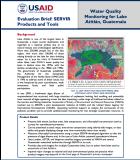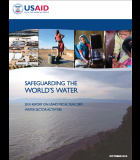Multi-Sector Alliances Program (Alianzas)
The project pioneered new mechanisms for cooperation between public and private partners. Alianzas formed alliances by inviting new potential partners to participate in existing projects and jointly create solutions that could be implemented through nongovernmental organizations (NGOs) or government-led projects.
The overall purpose of Alianzas was to extend coverage and improve the quality of existing health and education services and incorporate state-of-the-art and proven approaches for increased social sector investments. Alianzas focused on maternal and child health, including promoting breastfeeding and family planning, as well as community and school nutrition, and workplace programming in support of HIV prevention.
Activity Description
Partnerships that received funding for activities supporting nutrition under this CA supported projects that improve maternal and child nutritional status and dietary practices, especially among pregnant and lactating women and children under two years of age, as well as other interventions to improve food security. We focused on the seven essential nutrition actions, adapting messages to local language and cultural realities. Alliance-building activities focused on creating partnerships for the following types of activities:
- AIEPI AINM-C. Alianzas strengthened and expanded AIEPI AINM-C interventions at the community level that included monthly weighing sessions, effective counseling of caregivers to improve breastfeeding, complementary feeding, hygiene practices, and referral of cases to clinical services if necessary.
- Mejores Familias. Designed by FUNDAZUCAR, the Mejores Familias project is aimed at improving food and nutritional safety at the community level. The project focuses on education and training of women in RH and care of children under the age of five. Specifically, the project strengthens women’s capacities, among them self-esteem, community participation, and the contribution that one woman can have in her personal, family, and community surroundings. The Mejores Familias model was implemented both by FUNDAZUCAR as well as by BANASA, allowing the expansion of the project to new areas and new implementers.
In addition, the project improved schools through infrastructure development. Based on a comprehensive health and education post-disaster assessment developed by the Government of Guatemala, Alianzas rebuilt, furnished, and equipped primary healthcare facilities and schools, and also restored access to water and sanitation systems.
Expected Outcomes
- Improved quality and expanded access to Family Planning/Reproductive (FP/RH) and Maternal Child Health (MCH) information, education, counseling and services
- Improved nutrition, sanitation, and better dietary and hygienic information, education, counseling practices
- Availability of sustainable and culturally adapted health care and nutrition services increased
Actual Outcomes
- 202,008 women and children obtained increased access to maternal and child health services
- 172,494 women and children obtained increased access to projects that addressed growth monitoring and promotion of improved feeding and health and hygiene practices
- 43 million liters of water disinfected



